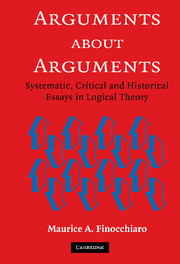Book contents
- Frontmatter
- Contents
- Preface and Acknowledgments
- Introduction : An Approach to a Branch of Logic
- Theorizing about reasoning and argument
- Fallacies and asymmetries
- Critiques
- Historical analyses
- 18 The Concept of Ad Hominem Argument in Galileo and Locke (1974)
- 19 Newton's Third Rule of Philosophizing : A Role for Logic in Historiography (1974)
- 20 Logic and Rhetoric in Lavoisier's Sealed Note : Toward a Rhetoric of Science (1977)
- 21 The Concept of Judgment and Huygens' Theory of Gravity (1980)
- 22 Empiricism, Judgment, and Argument : Toward an Informal Logic of Science (1988)
- 23 Criticism, Reasoning, and Judgment in Science (1995)
- Selected Bibliography
- Index
22 - Empiricism, Judgment, and Argument : Toward an Informal Logic of Science (1988)
from Historical analyses
Published online by Cambridge University Press: 05 February 2015
- Frontmatter
- Contents
- Preface and Acknowledgments
- Introduction : An Approach to a Branch of Logic
- Theorizing about reasoning and argument
- Fallacies and asymmetries
- Critiques
- Historical analyses
- 18 The Concept of Ad Hominem Argument in Galileo and Locke (1974)
- 19 Newton's Third Rule of Philosophizing : A Role for Logic in Historiography (1974)
- 20 Logic and Rhetoric in Lavoisier's Sealed Note : Toward a Rhetoric of Science (1977)
- 21 The Concept of Judgment and Huygens' Theory of Gravity (1980)
- 22 Empiricism, Judgment, and Argument : Toward an Informal Logic of Science (1988)
- 23 Criticism, Reasoning, and Judgment in Science (1995)
- Selected Bibliography
- Index
Summary
The concept of argument has always been of central importance in the philosophy of science. This was true even in the heyday of logical empiricism, since the logical component of the latter in effect meant that great emphasis was being placed on a particular conception of argument, which may be called formal, mathematical, deductive, demonstrative, or logicist. More recently, other approaches have displaced logical empiricism from its position of dominance, but it would be as much of a mistake to think that the focus on argument has thereby waned, as it would be to think that the empirical component of logical empiricism really involved that much empiricism, or at least any more than what would be allowed by proponents of other approaches. On the contrary, what has happened is that the concept of argument has become even more central since the nonlogicist conception of argument turns out to be very useful in analyzing features of science that recent empirical-historical research about science has shown to be of paramount importance, such as the phenomena of scientific change and disagreement (e.g., see Pera 1982). Thus, the proper appreciation of the role of argument in science requires a proper appreciation of a nonlogicist, argumentative conception of argument, just as to appreciate that the death of logical empiricism does not mean the demise of any empirical science one must not take the meaning of empiricism for granted.
- Type
- Chapter
- Information
- Arguments about ArgumentsSystematic, Critical, and Historical Essays In Logical Theory, pp. 386 - 408Publisher: Cambridge University PressPrint publication year: 2005



